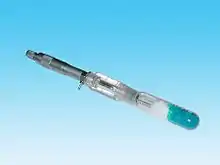Hanging mercury drop electrode
The hanging mercury drop electrode (HMDE or HDME) is a working electrode variation on the dropping mercury electrode (DME). Experiments run with dropping mercury electrodes are referred to as forms of polarography. If the experiments are performed at an electrode with a constant surface (like the HMDE) it is referred as voltammetry.

Like other working electrodes these electrodes are used in electrochemical studies using three electrode systems when investigating reaction mechanisms related to redox chemistry among other chemical phenomenon.[1][2][3][4]
Distinction
The hanging mercury drop electrode (HMDE) produces a partial mercury drop of controlled geometry and surface area at the end of a capillary in contrast to the dropping mercury electrode (DME) which steadily releases drops of mercury during an experiment. The disadvantages a DME experiences due to a constantly changing surface are not experienced by the HMDE since it has static surface area during an experiment. The static surface of the HMDE means it is more likely to suffer from the surface adsorption phenomenon than a DME. Unlike solid electrodes which need to be cleaned and polished between most experiments, the self-renewing HMDE can simply release the contaminated drop and grow a clean drop between each experiment.
References
- Bard, Allen J.; Larry R. Faulkner (2000-12-18). Electrochemical Methods: Fundamentals and Applications (2 ed.). Wiley. ISBN 978-0-471-04372-0.
- Zoski, Cynthia G. (2007-02-07). Handbook of Electrochemistry. Elsevier Science. ISBN 978-0-444-51958-0.
- Kissinger, Peter; William R. Heineman (1996-01-23). Laboratory Techniques in Electroanalytical Chemistry, Second Edition, Revised and Expanded (2 ed.). CRC. ISBN 978-0-8247-9445-3.
- Skoog, Douglas A.; F. James Holler; Timothy A. Nieman (1997-09-03). Principles of Instrumental Analysis (5 ed.). Brooks Cole. ISBN 978-0-03-002078-0.